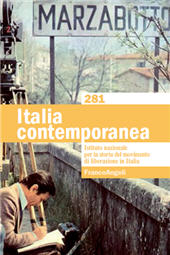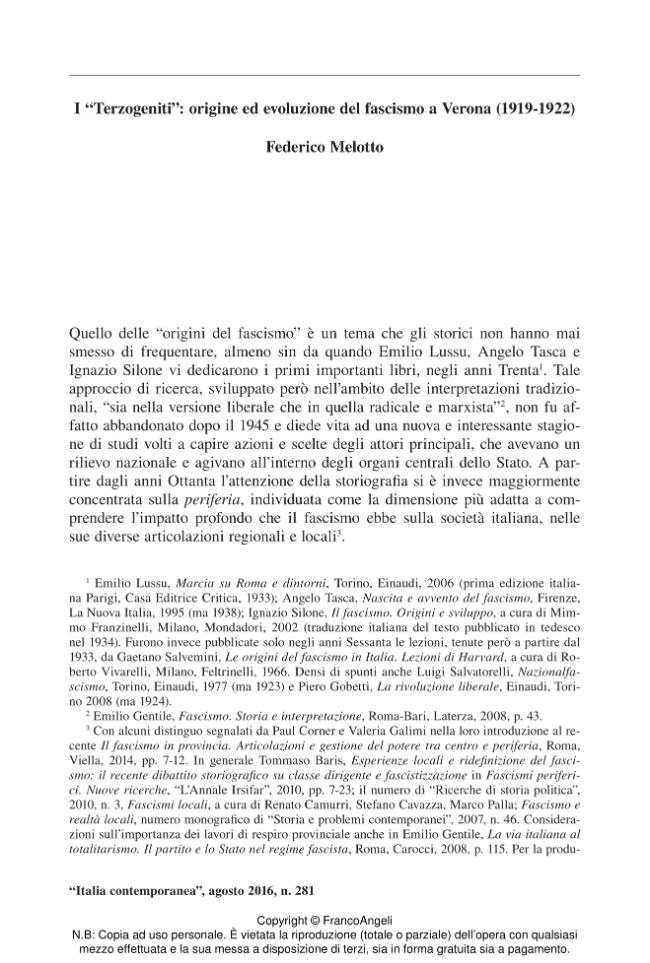2016 - Franco Angeli
Article
Digital Version
Download | Copy/paste | Printing
I Terzogeniti : origine ed evoluzione del fascismo a Verona (1919-1922)
31-56 p.
- Fino ad oggi la mancanza di una ricostruzione complessiva ed organica della storia del fascismo veronese ha certamente impedito di assegnare il giusto 'peso' ad alcuni nodi storiografici che sembrerebbero essere invece costitutivi del movimento di Mussolini, almeno per quanto riguarda il case study scaligero. Si sta alludendo in particolare alla questione delle origini, così ben indagata in molte realtà provinciali, ma che di fatto a Verona è rimasta avvolta in un inspiegabile cono d'ombra. Per questo motivo si vorrebbe proporre una narrazione complessiva degli esordi piuttosto precoci del Fascio di Verona, il 'Terzogenito' secondo la tradizione, essendo nato il 25 marzo 1919, a soli due giorni quindi dall'adunata di Piazza S. Sepolcro. Grazie all'utilizzo di una documentazione in buona parte inedita, si potrà definire, una volta per tutte, l'importanza sovra provinciale, se non addirittura regionale, del Fascio scaligero trovatosi a recitare, almeno per qualche tempo, un ruolo da protagonista nella parte più
- occidentale della Venezia euganea. Una rilevanza non soltanto cronologica - ma il fatto che sia il primo Fascio a nascere in Veneto non pare un dato di poco conto - ma anche più concretamente operativa giacché fu proprio ad Italo Bresciani, leader indiscusso del primo fascismo cittadino, che si rivolse, intorno alla metà dell'aprile 1920, il comitato centrale milanese per ottenere una maggiore diffusione del movimento non soltanto in provincia di Verona ma anche in altre città del Veneto, in particolare Padova e Vicenza.
- The lack of an overall and organic reconstruction of the history of Fascism in Verona has prevented historians from giving the appropriate 'weight' to some historical events, which are an integral part of Mussolini's movement, at least as far as the case study of Verona is concerned. In particular, the issue of the origins of Fascism, which has been thoroughly examined for other provincial areas, has been largely and quite inexplicably overlooked for the case of Verona. This article offers an overall analysis of the early beginnings of the Fascist Party in Verona, which has been referred to as the "Terzogenito", given that it was founded on March 25, 1919, just two days after the gathering in the San Sepolcro Square. Drawing on largely unedited documents, this article highlights, indisputably, the interprovincial - if not regional - importance of Verona's Fascist Party, which at least for some time came to play a leading role in the most western part of the Venice area. The importance of this issue is not onl
- y chronological - although the fact that Verona's Fascist Party was the first to be founded in the Veneto region seems to be quite relevant - but also political. Indeed, in the middle of April 1920 it was to Italo Bresciani, undisputed leader of Verona's early Fascist movement, that Milan's Central Committee turned to in order to assure a more widespread presence of the movement not only in the province of Verona but also in other cities of the Veneto region, in particular Padua and Vicenza.
Is part of
Italia contemporanea : 281, 2, 2016-
Information
ISSN: 2036-4555
KEYWORDS
- Fascismo, Origini, Verona, Partito nazionale fascista
- Fascism, Origins, Verona, Fascist Party
-
In this issue
- Combattentismo : il fascismo e le origini di un concetto
- I Terzogeniti : origine ed evoluzione del fascismo a Verona (1919-1922)
- Un'italiana che parlava agli italiani : Fausta Cialente redattrice di Radio Cairo
- L'epurazione delle collaborazioniste in alcune province venete
- La questione delle epurazioni all'interno del ministero degli Esteri : il caso dei rappresentanti italiani in Germania occidentale durante la prima legislatura (1948-1953)
- Uno strumento di ricerca per la storia materiale sportiva : la banca dati dell'Ufficio italiano brevetti e marchi
- Il genere, un'utile categoria di analisi storica : il saggio di Joan Scott 25 anni dopo
- La necessità di una rivoluzione morale : intrecci tra dimensione pubblica e privata nelle memorie sulla Resistenza di Antonio Giolitti e Claudio Pavone
- Discutendo di Gap : tre letture del libro di Santo Peli
- Recensioni
- Abstract
- Gli autori



